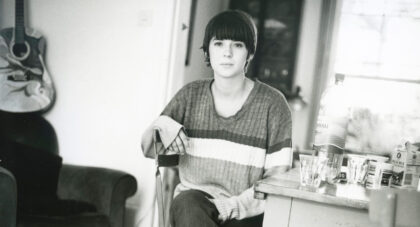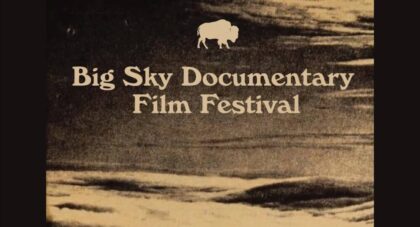(Sevens, a new feature on Aquarium Drunkard, pays tribute to the art of the individual song. From now through the election, Sevens will focus on political songs)
Only twenty-four years ago, Ronald Reagan was running for re-election under the cheering banner of a slicker, better America. The story that he had been selling for four years was pockmarked with portable phones and skyscrapers, a white collar dream that we could all believe in — a future-flag that would wave us all into the 21st Century. Every tiny burg would have a Mercedes dealership, their car hoods gleaming with the reflection of Old Glory. The irony, of course, is that Reagan was seventy-three years old and an internationally-known film star who hadn't lived in a small town in forty-seven years; The Gipper moved West in 1937, leaving Iowa City, IA, for Hollywood, a town which middle Americans would later demonize as a symbol of the out-of-touch elite. Reagan made himself a star in the early days of Hollywood, parlaying that success into a presidency of the Screen Actors Guild and, eventually, the country. In many ways, Ronald Reagan was the American Dream, pausing only long enough to dust off his shirt before he pulled the country up from the bootstraps, too. This man was One Of Us, and by 1984 he was setting up the kind of America that we had always believed was possible. We'd already won the love of the world in WWII; now was the time to globalize and pass our assets across country lines. The sun circled the earth in red, white, and blue.
Also in 1984, Bruce Springsteen, a rising rock star who had had plenty of critical success and even a Top Ten hit with “Hungry Heart,” prepared to release Born in the U.S.A. The record, Bruce's seventh, would be the first-ever compact disc released in the United States, the miniaturized flag on the cover punctuated by the faded blue of those famous Levis. And that summer, fifteen million Americans would make Springsteen a superstar. They would spin the future in their CD players, squint at the tricolor cover, and feel their heart pump along with the martial snap of Max Weinberg's snare drum. Garry W. Tallent's bass would thunder through the woofers of sports cars while the dawn's-early-light synth of Roy Bittan trickled from the tweeters. Red blood pumped. Blue eyes quelled. A golden age. And then came that thundercall shout, like a voice in the wilderness:
“Born down in a dead man's town,” it said. “Born in the U.S.A.”
CONTINUE READING AFTER THE JUMP.....
Only the good shit. Aquarium Drunkard is powered by its patrons. Keep the servers humming and help us continue doing it by pledging your support.
To continue reading, become a member or log in.


